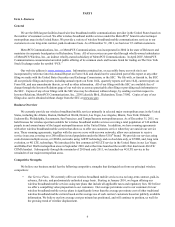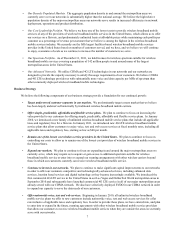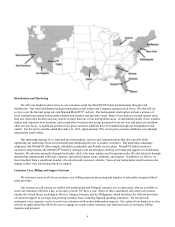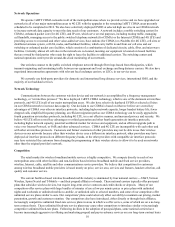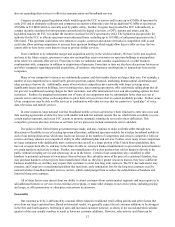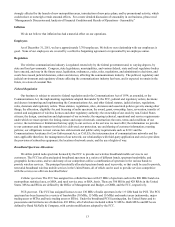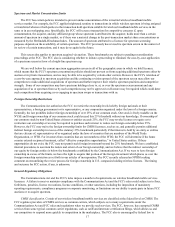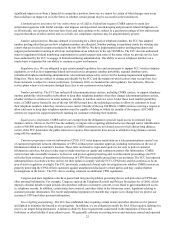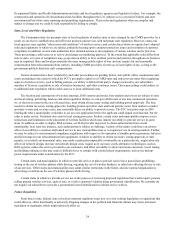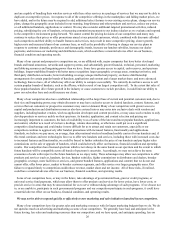Metro PCS 2011 Annual Report Download - page 27
Download and view the complete annual report
Please find page 27 of the 2011 Metro PCS annual report below. You can navigate through the pages in the report by either clicking on the pages listed below, or by using the keyword search tool below to find specific information within the annual report.16
years, and two-thirds of the population of the licensed area within ten years, or otherwise provide substantial service to the
licensed area within the appropriate five- and ten-year benchmarks of their initial license grant date. Broadband PCS licensees
holding 10 MHz and 15 MHz licenses generally must construct facilities to provide service to 25% of the licensed area within
five years of their initial license grant date, or otherwise make a showing of substantial service. AWS licenses are required to
construct facilities to provide substantial service by the end of the initial 15-year license term. The FCC defines substantial
service as service which is sound, favorable and substantially above a mediocre service level only minimally warranting
renewal. Either we, or our predecessor-in-interest for acquired licenses, satisfied the applicable five-year coverage requirement
for each of our broadband PCS licenses and the ten-year requirement for those PCS licenses that already have been renewed.
The 700 MHz licenses are subject to more stringent performance requirements. To avoid any possible loss of rights, we
would need to provide wireless coverage to 35% of the geographic area of our licensed EA in four years, or by June 2013, and
70% of the licensed geographic area by the end of the license term. Our 700 MHz license has an adjacent digital television
station, with which we must not interfere. This restriction will make construction of this license difficult and our ability to
reach an accommodation with the television operator is uncertain at best. While the FCC occasionally has granted brief
extensions to, and limited waivers of, license construction requirements, we cannot expect any such relief to be granted in light
of the FCC's increased efforts to recapture unused spectrum due to the broadband wireless spectrum shortage. As a
consequence, any licensee failing to meet these coverage requirements risks forfeiting their license and, in some cases, being
subject to fines or monetary forfeitures.
The FCC also may adopt more stringent build-out requirements, impose further sanctions on licensees which do not meet
construction thresholds or create incentives for licensees to accelerate their build-out as a result of the FCC's concern over a
shortage of needed broadband wireless spectrum. The FCC also could act on its NPRM and impose more stringent renewal and
discontinuance of service requirements, and apply those changes retroactively to existing licenses that will be renewed in the
future.
Revocation of Licenses
The FCC may deny applications for FCC licenses, deny renewal of FCC licenses, and revoke FCC licenses, in extreme
cases where a licensee is found to lack the requisite qualifications to be a licensee. For example, the FCC may revoke a license
or deny an application of an entity found in a judicial or administrative proceeding to have knowingly or repeatedly engaged in
conduct involving felonies, possession or sale of illegal drugs, fraud, antitrust violations or unfair competition, employment
discrimination, misrepresentations to the FCC or other government agencies, serious violations of the Communications Act or
FCC regulations, or a failure to meet construction obligations. If any FCC license of ours is denied or revoked for cause, this
action may have an impact on our ability to secure additional spectrum in the future, via auctions or through assignments in
connection with third party private transactions.
Transfer and Assignment of FCC licenses
The Communications Act requires prior FCC approval for assignments or transfers of control of any license or
construction permit, with limited exceptions. In granting FCC approval for assignments or transfers, the FCC may impose
conditions upon such assignments or transfers which it finds to be in the public interest. To date, we have managed to secure
FCC consent to a variety of assignments and transfers without undue delay or the imposition of conditions outside of the
ordinary course. If we are acquired, or acquire another entity, or experience a change in control, in the future, the FCC may
disapprove the transfer of control or assignment, impose conditions, or otherwise require divestitures of some or all of our
spectrum, licenses, or other assets.
Disaggregation, Partitioning and Spectrum Leasing
The FCC allows spectrum and service areas to be subdivided, partitioned, or disaggregated, geographically or by
bandwidth, with each resulting license covering a smaller service area and/or including less spectrum. Any such partition or
disaggregation is subject to FCC approval, which historically have been granted, but cannot be guaranteed. The FCC also has
adopted policies to facilitate development of a secondary market for unused or underused wireless spectrum by permitting the
leasing of spectrum to third parties. These policies provide us, new entrants, and our competitors with alternative means to
obtain additional spectrum and allow us to dispose of excess spectrum, subject to FCC approval and applicable FCC
conditions.


